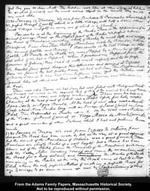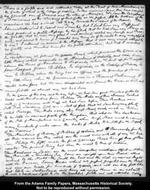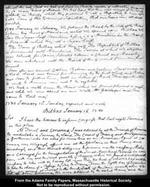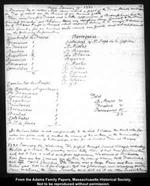a Mountain too or rather a Hill upon which a part of the Town stands, and upon the Top of which are the Ruins of an Ancient Castle.
There were some few Trades and a little Appearance of Business here; but the principal Occupation was Religion. Upon my expressing some Curiosity to the Number of Religious Houses in Burgos, which appeared to me to be enough to devour a whole Country for an hundred miles round, our Guide went out and procured me the following Information.
Combentos de Fraires.
| Franciscos |
1 |
| La Trinidad |
1 |
| Benitos |
1 |
| Augustinos |
2 |
| Dominicos |
1 |
| Mercenarios |
1 |
| Carmelitos |
1 |
|
8 |
Combentos de Monjas.
| Sta. Dorothea Augustinas |
1 |
| Sta. Franciscas |
2 |
| Carmelitas |
1 |
| Augustinas |
1 |
| Trinitarias |
1 |
| Bernardas |
2 |
| Benitas |
1 |
| Calatrabas |
1 |
| Sn. Il de fonso |
1 |
Parroquias.
| Cathedral y St. Iago de la Capilla |
| St. Nicolas |
| Sn. Roman |
| La Blanca |
| Bejarua |
| Sn. Martin |
| Sn. Pedro |
| Sn. Cosmes |
| Sn. Lesmes |
| Sn. Esteban |
| Sn. Gil |
Total
| De Monjas |
10 |
| Fraires |
8 |
| Parroquias |
15 |
|
33 |
As the sum total is not conformable to the List I suppose the Monk who furnished our guide with it, omitted the names of two or three in the Enumeration. But what an Army of Ecclesiasticks is this for so small a Town as Burgos.
1780. January 12. Wednesday.
We passed through several Villages, rode along the Side of a River; the Country more hilly than it had been for some time past, but it had a naked and poor appearance. We arrived at Bribiesca. Here there are two Convents one of Men, the other of Women, both Franciscans, and
one two Parish Churches. The Tavern was a large House and there were twelve good beds in it for Lodgers: Yet no Chimneys nor Windows, and the same indelicacy, the same Smoke and dirt as in all other Inns on the journey.
Page 2
Yet they gave Us clean Sheets. The Kitchen was like all other Spanish Kitchens the greatest Curiosity and the most odious Object in the World. They are all very much alike.
1780. January 13. Thursday.
We rode from Bribiesca to Pancourbo where We dined. We passed through Courbo, which is a little Village, with half a dozen other small Villages in Sight, in every one of which is a Church.
Pancourbo is at the beginning of the Rocks. There is the Appearance of an ancient Carriage Road up the steepest part of the Rocks. We passed between two Rows of Mountains consisting wholly of Rocks, the most lofty and craggy Precipices, I ever saw. These Rocky Mountains made the Boundary between the ancient Castile and Biscay. Pancourbo is the last Village in Old Castile. At Puente de la Rada, We were stopped by a Number of Officers and asked, if We had a Passport. When I produced my Passport from the Governor of Gallicia, they read it, with much respect, and let Us pass. We travelled four good Leagues this Afternoon and arrived at Ezpexo. Here We found the best public House, We had yet seen. The Neighbourhood of Biscay seemed to have had some Influence here; yet the Kitchen was Spanish like all others and their was neither Chimney nor Window in the House.
There was not a Tavern We had seen, but was filled with Religious Prints and Images, not indeed in the exquisite Style of Art of the ancient Greek and Roman Penates, but of very coarse and vulgar Workmanship. There were two beds in a Chamber, at the head of each of which was a Delph Vessell, for holy Water, Agua Santa, or Agua Benita. At the head of each also was a decent Cross about Nine Inches long, with an Image of Jesus Christ in some Metal, Tin, Bellmetal or Pewter, upon it. On the Wall was a Picture of the Virgin of Mount Carmel, or Virgo Maria de Monte Carmelo, and a great number of other Pictures, which I had not patience to enumerate.
1780 January 14. Fryday.
We rode from Ezpexo to Ordu a, four Leagues. The Road had been made by Art, all the Way, at a great expence: but the descent of the Mountains of Ordu a was a great Curiosity. Those Mountains are chiefly Rocks of a vast height: but a Road has been blown out of the Rocks, from the Pinnacles of the Mountains, quite down into the Valley. After winding round and round the mountain, with the Road for a long distance, and remarking observing the Marks of the Drills remaining in the Rocks all the Way, the Road came at last to a steep Pitch, where the only possible Method of making a passable Road for any Carriage, to go down or come up was by Serpentineing it thus [No transcription available -- see page image]
Page 3
There is a fertile and well cultivated Valley at the Feet of these Mountains, in the Center of which is the Village of Ordu a. In this narrow Space they have crouded two Convents one of Fraires and the other of Monjas. We saw the lazy Drones of Franciscans at the Windows of their Cells, as We passed. Att the bottom of the mountains We had a small Toll to pay, towards the Support of the Road. The Administrator sent to search our Trunks, but I sent him my Passport which produced a polite Message by his Clerk, that he had seen my Name in the Gazette; that he was very glad I was arrived; wished me Success and Prosperity; and desired to know if I wanted any thing, or if he could be any Way usefull to me? I returned in Answer to the Message that I was very much obliged by his Civility, and thanked him for his polite Attention; but that I wanted nothing.
In the Afternoon, We followed the Course Road, which pursues the Course of a little River, which originates in the Mountains of Ordu a, and rode down between two Rows of Mountains to Lugiando, where We put up for the night four Leagues from Bilbao. In Lugiando, in the Lordship of Biscay, so near to Bilbao, where the King had no Officers, and the Grandees of Spain very little Land, where the Government was in a Biennial Parliament, I expected better fare, but We were disappointed and found the House as dirty and uncomfortable as almost any We had seen.
In the Course of this day and the day before We had seen great Numbers of Mules loaded with Merchandizes from Bilbao. The Mules and their Drivers looked well, in Comparison with those We had seen before. Their Burthens were Salt Fish, Sardines, Cod, and a sort of fish that We saw here, very plenty, called Besugo. The Mules carry also, Horse Shoes, ready made in Bilbao to be sold in various parts of the Kingdom. But what an Idea does this give of the State of Manufactures in a Country, when Horse Shoes must be carried many hundreds of miles upon the backs of Mules, to be sold for the Supply of the Farriers?
The Mountains of Biscay, of Bilbao, of Ordu a, and Pancourbo, for by all these names are they called, are the most remarkable of any We had seen. Phillip the fifth made the first Carriage Road, through those of Pancourbo: The present King had done the most to those of Ordu a.
The Mountains in Spain are the most irregular, misshapen Objects in Nature. They Resemble a tumbling Sea. Some are upright upon their Bases: others inclined to the North, the South, the East and the West in various Angles with the
Horison. Some, Under which We passed, projected over the Road and over our heads for hundreds of Yards, and will one day fall like that lately in Switzerland and bury all under them in an instant. It was a vexatious Sight to see the beautiful, fertile and well cultivated Valley,
Page 4
almost the only Spot We had yet seen in Biscay capable of cultivation, devoured by so many hives of Drones. We had hoped that there was enough of the Spirit of Liberty in Biscay, which they presumed to call a
Republick, to have dissipated some of this tyrannical Superstition. But our hopes were all disappointed.
1780. January 15. Saturday.
We followed the Road, by the Side of the River between two Rows of Mountains, untill We opened upon Bilbao. We saw the Sugar Loaf sometime before, i.e. a Mountain in the Shape of a Piramid which they call a Sugar Loaf.
The Town of Bilbao, which they call The Republick of Bilbao, is surrounded with Mountains. The Tavern at which We Alighted was tolerable, for Spain, situated between a Church and Monastry. We were entertained with the Musick of the Convent from our first Arrival.
Soon after our Arrival Captain Babson and Captain Lovat made Us a Visit. Lovat was bound for America, by the first Wind, and Babson was soon to follow him; both in Letters of Mark. These opportunities to write to America were not to be neglected.
We took a walk down the River which We found pleasant enough; and while We were absent on our Walk, Mr. Gardoqui and Son came to visit me.
1780 January 16. Sunday.
Reposed and wrote.
Bilbao January 16. 1780
Sir
I have the honour to inform Congress, that last night I arrived in this place.
At Ferrol and Corunna, I was advised by all the Friends of America to undertake a journey by Land. The Consul of France, and Mr. Lagoenere, a Gentleman who has acted for some time as an American Agent at Corunna, very obligingly offered me all the Assistance in their Power, and accordingly used their utmost dilligence to procure me the necessary Mules and Carriages, for the transportation of the small Number of Persons in company with me, and the small quantity of Baggage, which We found it indispensibly necessary to take with Us, having left more than two thirds of what We had with Us to take the chance of a Passage by Sea, to France. From the Eighth day of December, when We arrived at Ferrol, to the twenty sixth of the same month, when We sat off, from Corunna, We were detained by the violent Rains, and the




